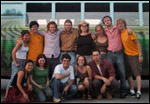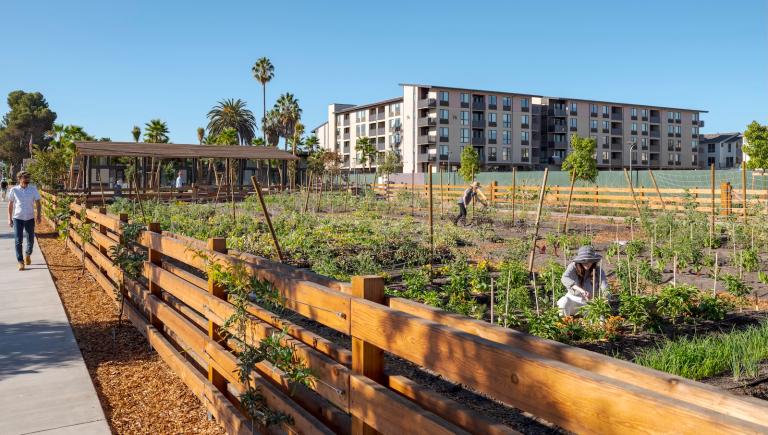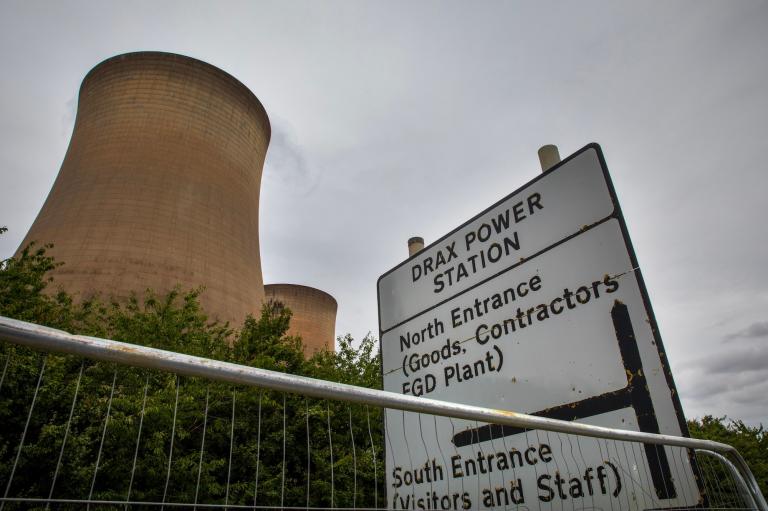
The Road to Detroit campaign is run by 11 student organizers from around the U.S., one big, beautiful biodiesel and veggie-oil bus, and many friends and allies. Road to Detroit is a campaign of Energy Action, a student and youth clean-energy and global-warming coalition.
Friday, 19 Aug 2005
DETROIT, Mich.
We know you know about fuel-efficient cars. You may even own one. Peak oil, the rising price at the pump, and new car technology have made headlines from coast to coast and back again; you’ve probably even considered naming your first born “Prius.” This summer, a group of student organizers have taken to the road in an attempt to build and strengthen the growing clean-car movement around a word that you probably don’t often think of: Detroit.
The Road to Detroit campaign’s beginning is reminiscent of a French film: a dark café, snow falling outside, a group of students huddled around a map suddenly point to the same spot and with a wild look in their eyes whisper, “Detroit!” The idea was simple. Cars are the major contributor to global warming. Cars are made in Detroit. We’re going to go there.
And then it all got a little more complicated. How? Who? We don’t have any money. My parents told me to get a job. Etc., etc. “Don’t get so caught up in the details!” someone said. So we didn’t; we got right down to the vision. It goes like this:
We see America’s dependence on foreign oil costing us jobs, polluting our air and water, and making our country less secure. We also see an incredible opportunity. By dramatically increasing the efficiency of our vehicles, moving toward alternative transportation fuels, and investing in a transportation system for the 21st century, we can put the city of Detroit and all of America on a more stable and prosperous path through a new national energy vision.
After a few months, about a hundred conference calls, tremendous help from the student clean-energy coalition Energy Action, and many missed homework assignments (sorry, Professor Dry), we got Road to Detroit moving … literally. In early June, our biodiesel and veggie-oil tour bus was on the road with the ambitious goal of logging 12,000 miles before the summer’s end.
We’re happy to say the bus and its brave crew of eight student organizers — despite a few breakdowns (of both the bus and the organizers) — have achieved that goal with flying colors. In their journey crisscrossing the country, the Road to Detroit bus activists educated citizens about state clean-car bills, supported the Jumpstart Ford coalition, and talked to people in more than 35 cities and 26 states about the need to revitalize the auto industry with a more sustainable and socially responsible energy vision.
Throughout, they remained focused on the key task at hand: gathering signatures on Road to Detroit’s Clean Car Pledge. The pledge asks people to agree that the next car or truck they buy will get at least 40 miles to the gallon, meet California’s superior air-pollution standards, and be union-made. We’ve collected 12,000 signatures so far and are hoping to hit 15,000 by Aug. 22. Make sure to sign!
The bus finished its final leg last night, from Chicago to Detroit. For the last two weeks, another group of Road to Detroit organizers has been working in the Motor City, preparing for this weekend’s “Drive the Future” events and getting to know the lay of the land here in Motown.
The Supremes, race riots, Henry Ford, urban decay, Eminem: these are the things that most people tend to associate with the city of Detroit. Today, the auto industry that made the city great has all but left the most isolated pockets of downtown, its factories relocated throughout the Midwest and the wealthier suburbs where its executives live. The signs of post-industrial decay are everywhere: abandoned homes and factories, men and women without work slowly ambling up and down Woodward and Cass Avenues, and tired business fronts revealing mostly empty shelves. Just to give you an idea, the “Natural Foods Co-op” here in the city is nothing more than two metal tables with a few bottles of organic vitamins and granola bars in the front room of an otherwise empty building.
But in the midst of it all, there is an incredible amount of hope, activism, and commitment, and a sense that big changes are coming. Grace Boggs, a 90-year-old activist, sharp as a tack, is pulling youth together to revitalize their community of western Detroit. Over on Cass Ave., Back Alley Bikes gives free bike-repair lessons to youngsters, educating them about further possibilities in the community. A few blocks away, the Trumbleplex lights up at night with anarchist and youth gatherings, sharing music and information about upcoming events, like an environmental-justice poetry slam happening this month. Across the city, hundreds of abandoned lots are being transformed into community gardens and children’s centers, while plans have been drawn up to create a self-sustained urban farming community in one part of town.
As we pressure the Big Three to change their ways, we must remember this city and its potential. The auto industry is the enemy du jour for many environmentalists, yet, while San Francisco, Seattle, and other coastal meccas are havens for visionary urban planning and sustainability efforts (and the funding and support they require), Detroit is often forgotten.
This weekend, Road to Detroit will begin to bridge that gap. On Saturday, our biodiesel and veggie-oil bus will make its victory drive in the Woodward Dream Cruise surrounded by 60,000 muscle cars and almost 2 million spectators. Sunday, we will bring together car experts, environmental-justice advocates, musicians, and students from around the country to dialogue about both the city of Detroit and the growing movement for fuel-efficient and zero-emissions cars. On Monday, we are expecting close to a hundred people to join us at our Drive the Future Signature-Delivery Rally. There, in partnership with the UAW Local 600, which represents the majority of Ford workers at the River Rouge Plant and many others, we will deliver our thousands of signatures to representatives from Ford, the biggest gas guzzler of them all.
Over the summer we’ve learned many important lessons and are looking forward to learning many more in the coming days. Remember to sign our Clean Car Pledge — and next time you’re looking for a vacation spot, think of Detroit.


